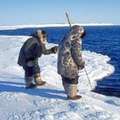 居住在北極的因奴伊特人(Inuit)因冰塊破裂不能夠再安全地進行狩獵;太平洋島民因為逐漸上升的海面而失去環珊瑚區;加勒比海島民受到劇烈風暴的侵襲;婆羅州部落看著他們的雨林失火;西藏人不知為何他們神聖的冰川融化,高山藥草植物消失。4月12和13日於牛津大學的國際研討會就是關注以上氣候變遷對全球原住民的威脅。
居住在北極的因奴伊特人(Inuit)因冰塊破裂不能夠再安全地進行狩獵;太平洋島民因為逐漸上升的海面而失去環珊瑚區;加勒比海島民受到劇烈風暴的侵襲;婆羅州部落看著他們的雨林失火;西藏人不知為何他們神聖的冰川融化,高山藥草植物消失。4月12和13日於牛津大學的國際研討會就是關注以上氣候變遷對全球原住民的威脅。
與會者都同意要適應已經發生的氣候變遷與避免全球暖化最壞的後果,關鍵在於原住民和科學家與政策決定者之間的溝通。
主持該會的牛津大學訪問學者沙力克博士(Dr. Jan Salick)表示:「原住民本身和民族生態研究者都要互助聯繫及開始可比較的氣候變遷研究和行動。原住民必須被納入氣候變遷的討論議題和決定政策的過程。」
最近由政府間氣候變遷專家小組(IPCC)公布的氣候變遷摘要報告,只提到「有害的衝擊…對於極區傳統原住民的生活方式。」但是根據會議組織者之一的牛津環境變遷研究中心人員表示:「原住民直接在前線遭受氣候變遷的迫害。」
The Inuit of the Arctic can no longer hunt safely as the ice is breaking up around them. Pacific Islanders are losing coral atolls beneath rising seas. Caribbean islanders are battered by violent storms. Tribes in Borneo watch as their rainforests catch fire. Tibetans wonder why their sacred glaciers are melting and why the alpine medicinal plants are disappearing. The threat of climate change to the world’s indigenous peoples was under the spotlight April 12 and 13 at an international symposium at Oxford University.
Participants agreed that communication among indigenous peoples and with scientists and policymakers is critical in adapting to the climate changes already underway and averting the worst consequences of global warming.
Visiting Fellow at Oxford University Dr. Jan Salick, host of the Oxford Indigenous People’s Symposium, said, "Both ethnoecological researchers and indigenous people themselves need to network and initiate comparable climate change research and action.""Indigenous peoples must be integrated into discussions of climate change and policy formation," he said.
The recent climate change summary report from the Intergovernmental Panel on Climate Change, IPCC, only mentioned "detrimental impacts ... to traditional indigenous ways of life’s in the Polar regions."
Yet according to the symposium organizers from Oxford's Environmental Change Institute, "Indigenous Peoples are in the immediate frontline of vulnerability to climate change.
全文及圖片詳見 ENS報導



